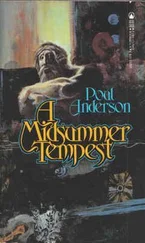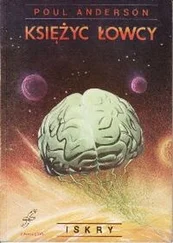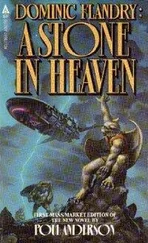The Authority booked first-class passages for all expeditionary personnel, which in the case of a hop up to the Moon meant a direct ferry traveling at one gee all the way. Standing by the observation window, an untasted drink in his hand, David Ryerson remarked: “You know, this is only the third time I’ve been off Earth. And the other two, we transshipped at Satellite and went free-fall most of the way.”
“Sounds like fun,” said Maclaren. “I must try it sometime.”
“You… in your line of work… you must go to the Moon quite often,” said Ryerson shyly.
Maclaren nodded. “Mount Ambarzumian Observatory, on Farside. Still a little dust and gas to bother us, of course, but I’ll let the purists go out to Plato Satellite and bring me back their plates.”
“And — No. Forgive me.” Ryerson shook his blond head.
“Go on.” Maclaren, seated in a voluptuous formfit lounger, offered a box of cigarettes. He thought he knew Ryerson’s type, serious, gifted, ambitious, but awe-smitten at the gimcrack fact of someone’s hereditary technic rank. “Go ahead,” he invited. “I don’t embarrass easy.”
“I was only wondering… who paid for all your trips, the observatory or—”
“Great ancestors! The observatory?” Maclaren threw back his head and laughed with the heartiness of a man who had never had to be very cautious. It rang above the low music and cultivated chatter; even the ecdysiast paused an instant on her stage.
“My dear old colleague,” said Maclaren, “I not only pay my own freight, I am expected to contribute generously toward the expenses of the institution. At least,” he added, “my father is. But where else would money for pure research come from? You can’t tax it out of the lower commons, y’ know. They haven’t got it. The upper commons are already taxed to the limit, short of pushing them back down into the hand-to-mouth masses. And the Protectorate rests on a technic class serving but not paying. That’s the theory, anyhow: in practice, of course, a lot of ‘em do neither. But how else would you support abstract science, except by patronage? Thank the Powers for the human snob instinct, it keeps both research and art alive.”
Ryerson looked alarmed; glanced about as if expecting momentary arrest, finally lowered himself to the edge of a chair and almost whispered: “Yes, sir, yes, I know, naturally. I was just not so… so familiar with the details of… financing.”
“Eh? But how could you have missed learning? You trained to be a scientist, didn’t you?”
Ryerson stared out at Earth, sprawling splendor across the constellations. “I set out to be a spaceman,” he said, blushing. “But in the last couple of years I got more interested in gravitics, had to concentrate too much on catching up in that field to well… also, I was planning to emigrate, so I wasn’t interested in — The colonies need trained men. The opportunities—”
Pioneering is an unlimited chance to become the biggest frog, provided the puddle is small enough, thought Maclaren. But he asked aloud, politely, “Where to?”
“Rama. The third planet of Washington 5584.”
“Hm-m-m? Oh, yes. The new one, the GO dwarf. Uh, how far from here?”
“Ninety-seven light-years. Rama has just passed the five-year survey test.” Ryerson leaned forward, losing shyness in his enthusiasm. “Actually, sir, Rama is the most nearly terrestroid planet they have yet found. The biochemistry is so similar to Earth’s that one can even eat some of the native plants and — Oh, and there are climatic zones, oceans, forests, mountains, a single big moon—”
“And thirty years of isolation,” said Maclaren. “Nothing connecting you to the universe but a voice.”
Ryerson reddened again. “Does that matter so much?” he asked aggressively. “Are we losing a great deal by that?”
“I suppose not,” said Maclaren.
Your lives, perhaps, he thought. Remember the Shadow Plague on New Kashmir? Or your children — there was the mutation virus on Gondwana. Five years is not long enough to learn a planet; the thirty-year quarantine is an arbitrary minimum. And, of course, there are the more obvious and spectacular things, which merely kill colonists without threatening the human race. Storms, quakes, morasses, volcanoes, meteorites. Cumulative poisoning. Wild animals. Unsuspected half-intelligent aborigines. Strangeness, loneliness, madness. It’s no wonder the colonies which survive develop their own cultures. It’s no wonder they come to think of Earth as a parasite on their own tedious heroisms. Of course, with ten billion people, and a great deal of once arable country sterilized by radiation, Earth has little choice.
What I would like to know is, why does anyone emigrate in the first place? The lessons are ghastly enough; why do otherwise sensible people, like this boy, refuse to learn them?
“Oh, well,” he said aloud. He signaled the waiter. “Refuel us, chop-chop.”
Ryerson looked in some awe at the chit which the other man thumbprinted. He could not suppress it: “Do you always travel first-class to the Moon?”
Maclaren put a fresh cigarette between his lips and touched his lighter-ring to the end. His smile cocked it at a wry angle.
“I suppose,” he answered, “I have always traveled first-class through life.”
The ferry made turnover without spilling a drink or a passenger and backed down onto Tycho Port. Maclaren adjusted without a thought to Lunar gravity, Ryerson turned a little green and swallowed a pill. But even in his momentary distress, Ryerson was bewildered at merely walking through a tube to a monorail station. Third-class passengers must submit to interminable official bullying: safety regulations, queues, assignment to hostel. Now, within minutes, he was again on soft cushions, staring through crystalline panes at the saw-toothed magnificence of mountains.
When the train got under way, he gripped his hands together, irrationally afraid. It took him a while to hunt down the reason: the ghost of his father’s God, ranting at pride and sloth from the tomb which the son had erected.
“Let’s eat,” said Maclaren. “I chose this train with malice aforethought. It’s slow enough so we can enjoy our meal en route, and the chef puts his heart into the oysters won-ton.”
“I’m not… not hungry,” stammered Ryerson.
Maclaren’s dark, hooked face flashed a grin. “That’s what cocktails and hors d’oeuvres are for, lad. Stuff yourself. If it’s true what I’ve heard of deep-space rations, we’re in for a dreary month or two.”
“You mean you’ve never been on an interstellar ship?”
“Of course not. Never been beyond the Moon in my life. Why should I do any such ridiculous thing?”
Maclaren’s cloak swirled like fire as he led the way toward the diner. Beneath an iridescent white tunic, his legs showed muscular and hairless, down to the tooled-leather buskins; the slant of the beret on his head was pure insolence. Ryerson, trailing drably behind in spaceman’s gray coveralls, felt bitterness. What have I been dragged away from Tamara for? Does this peacock know a mass from a hole in the ground? He’s hired himself a toy, is all, because for a while he’s bored with wine and women… and Tamara is locked away on a rock with a self-righteous old beast who hates the sound of her name!
As they sat down at their table, Maclaren went on, “But this is too good a chance to pass up. I found me a tame mathematician last year and sicced him onto the Schrodinger equation — Sugimoto’s relativistic version, I mean; Yuen postulates too bloody much for my taste — anyhow, he worked it out for the quantities involved in a dark star, mass and gravitational intensities and cetera. His results make us both wonder if such a body doesn’t go over to an entirely new stage of degeneracy at the core. One gigantic neutron? Well, maybe that’s too fantastic. But consider—”
Читать дальше
Конец ознакомительного отрывка
Купить книгу











